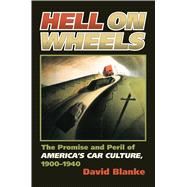
| Acknowledgments | p. ix |
| Introduction | p. 1 |
| The Car and American Life, 1900-1940 | p. 13 |
| Auto Use and Auto Accidents, 1900-1940 | p. 40 |
| The Dysfunctional Love Affair | p. 63 |
| Avoidable Accidents and the Challenge of Automotive Citizenship | p. 90 |
| Perfection and Perfectibility in Auto Safety Reform | p. 120 |
| The Mirrored Glasses: Enforcement and the Inevitable Auto Accident | p. 153 |
| Conclusion: Accidental Freedoms and the Risk Society | p. 183 |
| Notes | p. 205 |
| Bibliography | p. 245 |
| Index | p. 257 |
| Table of Contents provided by Ingram. All Rights Reserved. |
The New copy of this book will include any supplemental materials advertised. Please check the title of the book to determine if it should include any access cards, study guides, lab manuals, CDs, etc.
The Used, Rental and eBook copies of this book are not guaranteed to include any supplemental materials. Typically, only the book itself is included. This is true even if the title states it includes any access cards, study guides, lab manuals, CDs, etc.